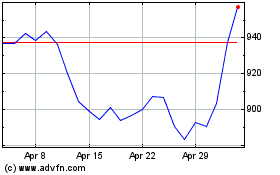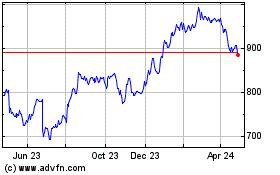By Betsy McKay
A person's chance of dying from Ebola increases substantially
every day until he or she receives treatment, according to results
from a landmark clinical trial conducted during a large epidemic in
a violent region of the Democratic Republic of Congo.
The study, published Wednesday in the New England Journal of
Medicine, confirmed that two experimental drugs outperformed two
others in saving the lives of people stricken with the deadly viral
disease in northeastern Congo.
The analysis also showed that patients' odds of dying rose 11%
for each day that they had symptoms before treatment began.
"This shows how acute Ebola virus disease can be," said Sabue
Mulangu, a co-lead author of the study and a researcher at the
National Institute of Biomedical Research in Congo's capital of
Kinshasa.
The findings, based on an analysis of 673 patients, help explain
why the world's second-largest Ebola epidemic has proven so
persistent and deadly, despite new drugs and a vaccine.
Of 3,298 cases of Ebola reported since August 2018, 2,197 died,
yielding a 67% mortality rate, according to the World Health
Organization.
Many people haven't sought medical treatment or have sought it
too late to be helped. Some have suspected that health-care workers
are part of a plot to harm them.
Violence has also complicated medical care as well as the
running of the clinical trial. Doctors and clinical-trial field
teams have dodged attacks by armed groups, and two of the treatment
centers they were working in were set on fire.
According to the new study, death rates were much lower for
those patients who received the investigational therapies when they
weren't yet severely ill, when levels of the virus in their blood
were low. "Viral load," as the virus levels are called, tends to be
lower early in the course of a disease.
"There's a correlation," said Richard Davey, another co-lead
author and deputy clinical director at the U.S. National Institute
of Allergy and Infectious Diseases.
People who were given a cocktail of three antibodies made by
Regeneron Pharmaceuticals Inc., called REGN-EB3, had a 34%
mortality rate overall. Patients with low viral loads, however, had
an 11% death rate.
Of patients given a single-antibody drug called mAb114,
developed by the NIAID, 35% died overall. Among those with low
viral loads, 10% died.
A quarter of patients in the study said they had received an
Ebola vaccine, which could have made their disease less severe. The
role that vaccination played needs to be studied further, Dr. Davey
said.
A vaccine by Merck & Co. has been given throughout the
epidemic to people at risk of exposure to Ebola. The epidemic would
have been larger without the vaccine, public health officials have
said. Testing of a second vaccine from Johnson & Johnson
recently got under way.
Regeneron and Ridgeback Biotherapeutics LP, a Miami biotech
company that licensed the NIAID drug, have said they plan to seek
approval from the U.S. Food and Drug Administration under a speedy
review process for breakthrough drugs.
An editorial published along with the study in the New England
Journal of Medicine said community education can help encourage
patients to seek care when they first feel sick.
"But early care of patients also requires the availability of
rapid diagnostics and ease of travel to treatment centers," wrote
Myron M. Levine of the University of Maryland School of Medicine in
Baltimore, author of the editorial. "These issues must be addressed
in future Ebola outbreaks."
The number of new Ebola cases has slowed significantly in recent
weeks, raising hopes that the epidemic could finally end soon,
after more than a year. But new violence erupted recently in the
city of Beni, where health workers are still caring for Ebola
patients and trying to find others they may have infected. A field
team for an extension phase of the drug trial is also working
there.
"It's hurting our operations," Ibrahima Soce Fall, the WHO's
assistant director-general for emergency response, said in an
interview. "We have been really, really struggling."
The WHO evacuated 55 staff temporarily from Beni, Dr. Fall said,
following violence by rebel forces, then attacks by angry residents
on United Nations buildings. Dr. Fall added that 70 staff remain in
Beni. The clinical trial field team is closely monitoring security
reports, trial leaders said.
Write to Betsy McKay at betsy.mckay@wsj.com
(END) Dow Jones Newswires
November 27, 2019 17:14 ET (22:14 GMT)
Copyright (c) 2019 Dow Jones & Company, Inc.
Regeneron Pharmaceuticals (NASDAQ:REGN)
Historical Stock Chart
From Mar 2024 to Apr 2024

Regeneron Pharmaceuticals (NASDAQ:REGN)
Historical Stock Chart
From Apr 2023 to Apr 2024
